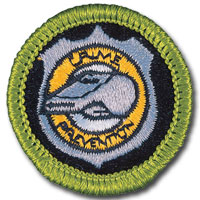

Preventing crime, which can be as simple as reducing the opportuntities for crime to occur, is far less costly than apprehending and bringing legal action against those who break the law and it helps save people from the anguish of being victims.
Requirements
- Discuss the role and value of laws in society with regard to crime and crime prevention. Include in your discussion the definitions of "crime" and "crime prevention."
- Prepare a notebook of newspaper and other clippings that address crime and crime prevention efforts in your community.
- Discuss the following with your counselor:
- The role of citizens, including youth, in crime prevention.
- Gangs and their impact on the community.
- When and how to report a crime.
- After doing EACH of the following, discuss with your counselor what you have learned.
- Inspect your neighborhood for opportunities that may lead to crime. Learn how to do a crime prevention survey.
- Using the checklist in this pamphlet, conduct a security survey of your home and discuss the results with your family.
- Teach your family or patrol members how to protect themselves from crime at home, at school, in your community, and while traveling.
- Help raise awareness about one school safety issue facing students by doing ONE of the following:
- Create a poster for display on a school bulletin board.
- With permission from school officials, create a pagelong public
service announcement that could be read over the public address system
at school or posted on the school's Web site.
c. Make a presentation to a group such as a Cub Scout den that addresses the issue. - Do ONE of the following:
- Assist in the planning and organization of a crime prevention program in your community such as Neighborhood Watch, Community Watch, or Crime Stoppers. Explain how this program can benefit your neighborhood.
- With your parent's and counselor's approval, visit a jail or detention facility or a criminal court hearing. Discuss your experience with your counselor.
- Discuss the following with your counselor:
- How drug abuse awareness programs such as "Drugs: A Deadly Game" help prevent crime.
- Why alcohol, tobacco, and marijuana are sometimes called "gateway drugs" and how gateway drugs can lead to the use of other drugs.
- Three resources in your city where a person with a drug problem or drug-related problem can go for help.
- How the illegal sale and use of drugs lead to other crimes.
- How to recognize child abuse.
- The three R's of Youth Protection.
- Discuss the following with your counselor:
- The role of a sheriff's or police department in crime prevention.
- The purpose and operation of agencies in your community that help law enforcement personnel prevent crime, and how those agencies function during emergency situations.
- Explain the role private security plays in crime prevention.
- Choose a career in the crime prevention or security industry that interests you. Describe the level of education required and responsibilities of a person in that position. Tell why this position interests you.